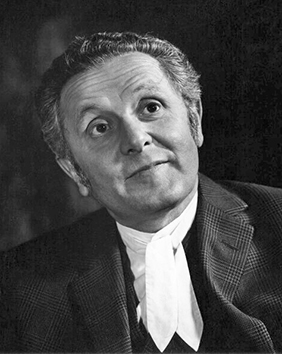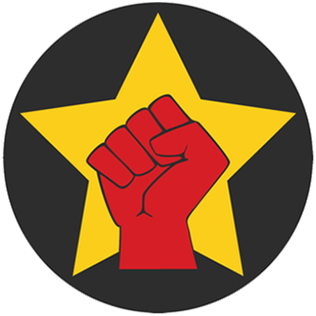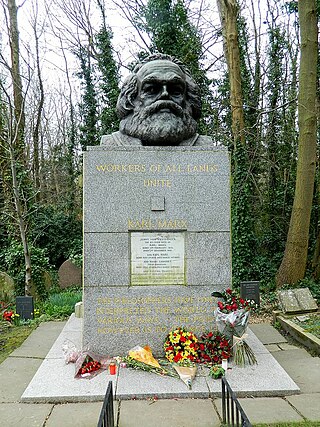
Trotskyism is the political ideology and branch of Marxism developed by Russian revolutionary and intellectual Leon Trotsky along with some other members of the Left Opposition and the Fourth International. Trotsky described himself as an orthodox Marxist, a revolutionary Marxist, and a Bolshevik–Leninist as well as a follower of Karl Marx, Frederick Engels, Vladimir Lenin, Karl Liebknecht, and Rosa Luxemburg. His relations with Lenin have been a source of intense historical debate. However, on balance, scholarly opinion among a range of prominent historians and political scientists such as E.H. Carr, Isaac Deutscher, Moshe Lewin, Ronald Suny, Richard B. Day and W. Bruce Lincoln was that Lenin’s desired “heir” would have been a collective responsibility in which Trotsky was placed in "an important role and within which Stalin would be dramatically demoted ".

Socialist Appeal was the British section of the International Marxist Tendency (IMT), founded in 1992 alongside the IMT by supporters of Ted Grant and Alan Woods after they were expelled from the Militant tendency of the Labour Party. In 2024 the Great Britain-based elements of the IMT were relaunched as the Revolutionary Communist Party.
James "Jock" Ritchie Haston (1913–1986) was a Trotskyist politician and General Secretary of the Revolutionary Communist Party in Great Britain.
The Proletarian Military Policy was a policy adopted by the Fourth International in response to World War II. It was an attempt to apply transitional demands such as trade union control of military training and the election of officers to transform what it characterised as an imperialist war into a revolutionary struggle against Nazism.

The Common Wealth Party (CW) was a socialist political party in the United Kingdom with parliamentary representation in the House of Commons from 1942 until 1946. Thereafter CW continued to function, essentially as a pressure group, until 1993.

Leopold Abse was a Welsh lawyer and politician. He was a British Labour MP for nearly 30 years, noted for promoting private member's bills to decriminalise male homosexual relations and liberalise the divorce laws. During his parliamentary career, Abse introduced more private member's bills than any other parliamentarian in the 20th century. After his retirement from Parliament he wrote several books about politics, based on his interest in psychoanalysis.
Charles Patrick Wall was an English Trotskyist political activist who was the Labour Party Member of Parliament (MP) for Bradford North from 1987 until his death. Wall was a long-standing member of the Militant group.
Jimmy Deane was a British Trotskyist who played a significant role in building the Revolutionary Socialist League. Along with Jock Haston and Ted Grant, he played a role during the Second World War in the Revolutionary Communist Party, the British section of the Fourth International.

Post–World War II demobilization strikes occurred within Allied military forces stationed across the Middle East, India and South-East Asia in the months and years following World War II. American military personnel based in occupied Germany were holding mass parades for speedier demobilization and in the Philippines formed soldiers committees and went on demonstrations calling for a return home. In India, thousands of Royal Air Force servicemen pushed for demobilization and went on strike citing grievances over conditions of work such as deaths in high temperatures in Cawnpore and overcrowding at RAF Jodhpur. A "Forces Parliament" was set up - effectively a workers' council, but was dissolved before the issues came to a head. The issue was a major subject of debate in the British Parliament. At one point Prime Minister Clement Attlee was presented with a petition by India-stationed servicemen that stated:
We have done the job we joined up to do. Now we want to get back home, both for personal reasons and because we think it is by work that we can best help Britain. No indication has been given of when we will see our families again. Is it because the government wishes to talk tough with other powers?
The Left Fraction, sometimes calling itself the Left Fraction, British Section of the Fourth International , was a Trotskyist organisation in the United Kingdom.

The Revolutionary Socialists (RS) are a Trotskyist organisation in Egypt originating in the tradition of 'Socialism from Below'. Leading RS members include sociologist Sameh Naguib. The organisation produces a newspaper called The Socialist.
Centrist Marxism represents a position between revolution and reformism. Within the Marxist movement, centrism thus entails a specific meaning between the left-wing revolutionary socialism and the right-wing reformist socialist. For instance, the Independent Social Democratic Party of Germany (USPD) and the British Independent Labour Party (ILP) were both seen as centrist because they oscillated between advocating reaching a socialist economy through reforms and advocating a socialist revolution. The parties that belonged to the Two-and-a-half and Three-and-a-half Internationals, who could not choose between the reformism of the Second International and the revolutionary politics of the Third International, were also exemplary of centrism in this sense. They included the Spanish Workers' Party of Marxist Unification (POUM), the Independent Labour Party (ILP), and Poale Zion.
The Workers' International League (WIL) was a Trotskyist group that existed in Britain from 1937 to 1944.
The Militant tendency, or Militant, was a Trotskyist group in the British Labour Party, organised around the Militant newspaper, which launched in 1964.
Revolutionary socialism is a political philosophy, doctrine, and tradition within socialism that stresses the idea that a social revolution is necessary to bring about structural changes in society. More specifically, it is the view that revolution is a necessary precondition for transitioning from a capitalist to a socialist mode of production. Revolution is not necessarily defined as a violent insurrection; it is defined as a seizure of political power by mass movements of the working class so that the state is directly controlled or abolished by the working class as opposed to the capitalist class and its interests.
The Revolutionary Communist Party was a British Trotskyist group, formed in 1944 and active until 1949, which published the newspaper Socialist Appeal and a theoretical journal, Workers International News. The party was the ancestor of the three main currents of British Trotskyism: Gerry Healy's Workers Revolutionary Party, Ted Grant's Militant and Tony Cliff's Socialist Workers Party.

Edward Grant was a South African Trotskyist who spent most of his adult life in Britain. He was a founding member of the group Militant and later Socialist Appeal.

Alan Woods is a British Trotskyist political theorist and author. He is one of the leading members of the Revolutionary Communist International (RCI) and was a founder of Socialist Appeal. He is political editor of the RCI's In Defence of Marxism website. Woods was a leading supporter within the Militant tendency within the Labour Party and its parent group the Committee for a Workers' International until the early 1990s. A series of disagreements on tactics and theory led to Woods and Ted Grant leaving the CWI, to found the Committee for a Marxist International in 1992. They continued with the policy of entryism into the Labour Party. Woods has expressed particularly vocal support for the Bolivarian Revolution in Venezuela, and repeatedly met with the Venezuelan President Hugo Chávez, leading to speculation that he was a close political adviser to the president.
Permanent revolution is the strategy of a revolutionary class pursuing its own interests independently and without compromise or alliance with opposing sections of society. As a term within Marxist theory, it was first coined by Karl Marx and Friedrich Engels as early as 1850. Since then different theorists, most notably Leon Trotsky (1879–1940), have used the phrase to refer to different concepts.

Far-left politics in the United Kingdom have existed since at least the 1840s, with the formation of various organisations following ideologies such as Marxism, revolutionary socialism, communism, anarchism and syndicalism.








